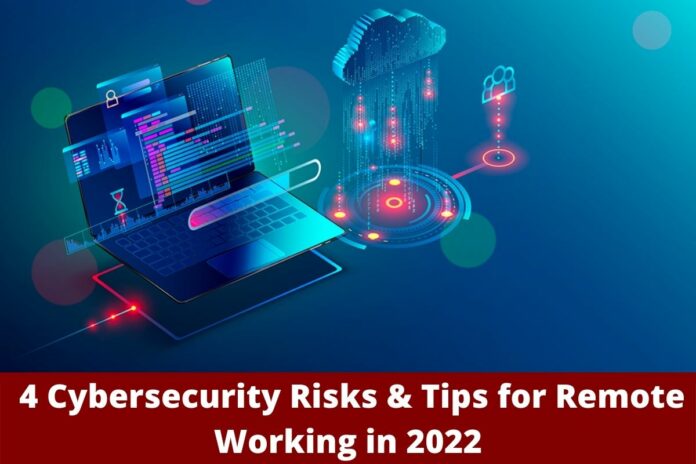Working from home has become considerably popular in the aftermath of the pandemic. Even after the pandemic has passed, many experts believe that remote working will continue to be popular in a variety of industries.
While working from home offers numerous advantages, it also exposes individuals and enterprises to a variety of cybersecurity dangers. As a result, it is critical to give home cybersecurity serious consideration. Most cybersecurity work-from-home threats can be readily mitigated by using a few simple Cybersecurity tips.
Companies that hire remote employees and engineers must keep them up to speed on cybersecurity rules and practices by providing frequent training and testing. Refreshers should be necessary at least twice a year, according to studies.
Certain cybersecurity dangers, such as phishing, have become more frequent as a result of the surge in remote working. One of the main issues is that, in most offices, an IT staff will be in charge of cybersecurity. With a distributed workforce working from home, employees must be more aware of the risks of cybersecurity.
Here are some of the best remote working cybersecurity tips to help keep you and your employees safe while working from home.
Start using antivirus and internet security software at home.
Investing in a complete antivirus package for you and your staff is one of the most effective security safety nets to incorporate while working from home.
According to sources, the global damage of cybercrime to enterprises is estimated to be over $1.5 billion per year. As hackers try to acquire access to sensitive files through people’s home internet networks and company VPNs, this number is only going to rise.
You, your company, and your employees could be vulnerable to ransomware, DDoS assaults, malware, spyware, and other forms of breaches as a result of these attacks.
Antivirus suites do the heavy lifting for you by providing automatic remote work security against a variety of dangers, including:
- Zero-day attacks (viruses taking advantage of security flaws before they are patched)
- Malware, spyware, and viruses
- Trojans and worms
- Phishing scams, including those sent via email
A complete antivirus suite can not only defend against up to 100% of online security threats, but it can also automatically update itself to keep up with any new and emerging dangers.
It also works quietly in the background of your other operations so that you won’t be aware of the effort it’s putting in.
2- Consider investing in a webcam cover.
Working from home mostly translates to participating in teleconferences and video chats, which demand the usage of your webcam. Unfortunately, malicious hackers can simply gain access to your webcam without your permission, putting your privacy at risk. Worse, if you have sensitive documents in your real workstation, hackers may be able to see them through your webcam.
If your webcam is not connected to your device, you should unplug it while not in use. If your webcam is built-in, you need to take extra precautions to protect yourself because a webcam attack might happen at any time.
Sliding webcam covers come in a variety of shapes, sizes, and colors to meet your specific demands. Most come with an adhesive layer that fits around your webcam, making them simple to install.
If your video conferencing software allows it, you might want to employ features like “blur backdrop” if it’s available. This can keep others in your meetings from spying on objects in your home’s background, which could contain sensitive information about you or your clients.
3. Use a VPN
Connecting your computer to the company’s Virtual Private Network (VPN connection) is a very common practice when working remotely, but this can open up new home office security ‘back doors’ that hackers could use.
First of all, it’s critical to provide employees with work-from-home security advice and guidance, as well as policies on how to be a safe remote worker. Companies should seek out help in order to improve the security of their VPN.
VPN security can easily be improved by using the most robust possible authentication method. Many VPNs employ usernames and passwords, but you might want to consider switching to the usage of smart cards. You can also improve your VPN encryption mechanism by switching from a Point-to-Point Tunneling Protocol to a Layer Two Tunneling Protocol.
Many VPNs require usernames and passwords, but you should consider switching to smart cards instead. Switching from a Point-to-Point Tunneling Protocol to a Layer Two Tunneling Protocol can also improve your VPN encryption process.
4- Secure your home Wi-Fi
Strengthening the security of your home Wi-Fi network is one of the simplest ways to assure cybersecurity for remote workers. You may accomplish this by following a few simple steps.
Rather than depending on the router’s default password, create a strong, unique password. You can update the password on your router’s settings page by typing “192.168.1.1” into your browser.
Make sure to pick a password that is difficult for others to guess. On the same settings page, you can alter your SSID or wireless network name to make it more difficult for third parties to identify and access your home Wi-Fi network. Use nothing that could be used to identify you, such as your name or home address.
Conclusion
The majority of the employees are working from home even now. And not every employee knows the know-how about cyber security, which can put the company’s data at risk. However, it doesn’t need to be done on purpose, but they can fall victim to a hacker’s doing. Therefore, the smart thing would be to hire a software engineer and have them build a program for you that will protect your employee’s from cyber attacks.
Hiring the best engineer for the job can be time-consuming and daunting, which is why you should consider having a match-making company to do the task for you. For example, you can reach out to companies such as Gaper.io. Their great reputation and customer reviews are enough to vouch for their quality match-making services between software engineers and companies.

